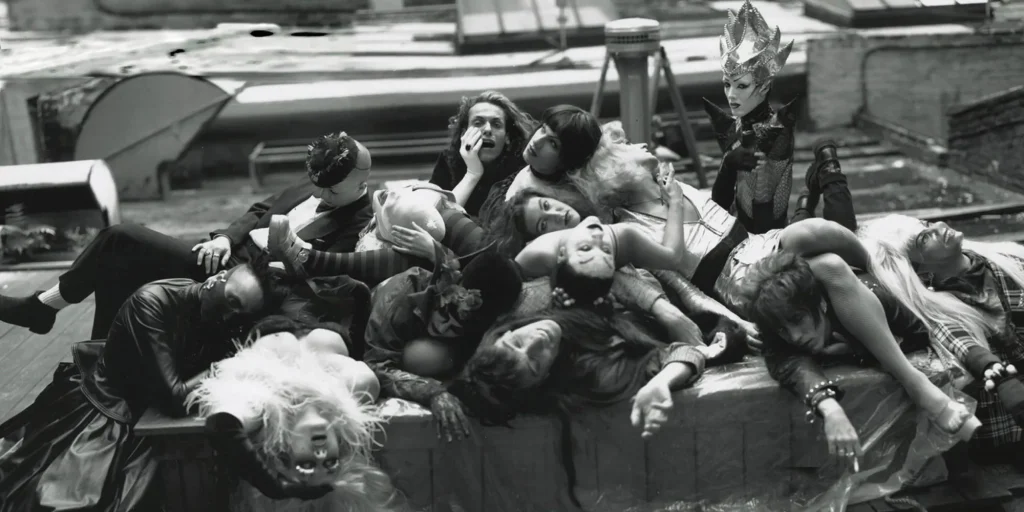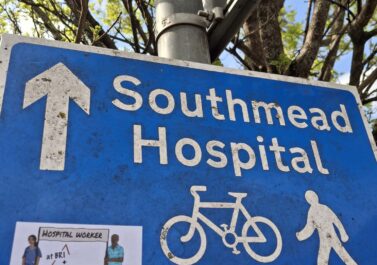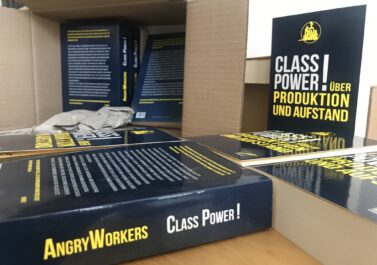
These are largely individual thoughts written down after a national meeting during which we decided to stop the official ‘national’ activities, such as the reading group. The thoughts primarily suggest tasks of a communist group in the current moment and continue to argue for a refocus on creating a base within essential industries from which to discuss a strategic sequence: from day-to-day autonomous self-defence – to workers’ decrees and workers’ control – to the development of a working class plan of transition.
Beyond west London
The initial proposal we made to fellow comrades was based on our effort in west London and suggested five main pillars of organisation: a local political collective, a local solidarity network focused on industrial areas, concrete workplace activity in relevant sectors, a political local newspaper, an international political exchange and debate. We saw these primarily as experimentations, in the sense that we had no defined formula of how to bridge the gap between our communist perspective and concrete activities, e.g. actions to get outstanding wages for a colleague or the effort to push a union-led wage struggle into a more radical direction. We hoped that workers’ self-organisation and a constant analysis of the social dimensions of our concrete struggles would create a political dynamic towards a fusion of the day-to-day and the future perspective.
We then tried to widen our organisational efforts beyond the area of west London. Comrades in Croydon started a solidarity network during the pandemic, which petered out after about a year for two main reasons: firstly, because we had failed to first establish a core of comrades who were politically tuned in and motivated and therefore able to carry the project beyond the inevitable threshold of frustration when there are no immediate results of our activities; secondly, because comrades who were working in local workplaces left their jobs too early, before the solidarity network could establish deeper connections. A similar attempt was made in east London, but apart from the period during the Tower Hamlet council workers strike, where one of the comrades was directly involved, the solidarity network faced the same structural problems as mentioned above and folded. Comrades in south London and Leeds/Sheffield also tried to form local groups, primarily through a more collective approach regarding the national reading group and through an analysis of what was already happening in terms of local struggles, but these efforts seemed to have lacked a clear enough focus.
Our efforts at Heathrow airport during the pandemic were more sustained due to the fact that a comrade, who we initially got to know during a union branch meeting, had been working there for a long time and that our activities in west London had generated working class contacts in the area. Initially we were able to produce newsletters, in particular during the British Airways and airport strike. The strikes took place during the lockdown and did not manage to break out of their defensive position. The structural power in some departments, for example in cargo, where workers worked overtime during the pandemic, was not used to defend the conditions of departments that the pandemic had put in a structurally weak position, for example tourism. Despite the fact that workers were represented by the same union, the union reinforced divisions and kept strikes apart by accepting separate agreements. Although the activity around Heathrow should have been our political focus, the comrades in London did not manage to support our comrade with a regular local presence and production of the newsletter. Perhaps it was not clear enough to everyone that the activity at Heathrow was the most advanced and significant at the time given the attack on workers, the climate change debate, the international dimension of the industry etc., or perhaps it was too much to expect from four, five comrades to travel out there every week.
From pandemic to program
One of the most cohesive ‘national’ efforts that we were able to undertake was to engage in a series of interviews with so-called essential workers during the first months of the pandemic and to discuss the political contradictions and tendencies that surfaced once the ‘hire-and-rehire’ wave hit. We tried to distil the insights from the interviews and discussions into a pamphlet. From this experience we grasped a clearer understanding for the need of a ‘working class program’ that takes the experience of workers and the objective contradictions of a particular conjuncture as a starting point. In the case of the pandemic, it was the experience of ‘essential labour’ in particular, followed by the attack of ‘fire and rehire’. We also saw that the temporary labour shortage pushed the situation in many workplaces to a breaking point: during recent decades these workplaces had undergone ‘just-in-time’ and ‘lean management’ to squeeze a maximum of labour with a minimum of productive investment.
While large parts of the left focused on the victim status of workers (“first they clap for you, then they fire you”) we could have emphasised the objective tendencies that pointed towards a break with victimhood: the now publicly discussed fact that ‘essential labour’ constitutes only a relatively small share of total labour, perhaps around 30 to 40% means that a radical shortening and redistribution of the working week is possible. The fact that ‘essential workers’ are largely badly paid, work long hours and are under ‘fire and rehire attack’ means that this group has, at least, an objective interest to push for a class line that attacks risky and parasitic bullshit jobs and tasks and advocates for a a shorter working week. Partial labour shortages within essential jobs meaning that workers are having to compensate for the brittle and underinvested conditions of current ‘supply chains’ and ‘outsourced services’ also means that they are in a position of considerable objective power; the fact that in the US we saw an increase in strike activity and a ‘great resignation’ during the pandemic showed us that there were serious kinks emerging in the social workhouse. Another experience was, at least in some of the workplaces, that it was a basic form of workers’ control that enforced infection control and health and safety measures on the job. We tried to refer to this basic workers’ control during the first disputes around ‘fire-and-rehire’ by emphasising that if we are able to control the work process, we should also be able to control the strike process against the cautious and top-down approach of the trade unions. Our line vis-a-vis the bosses’ attacks on jobs in the form of ‘fire-and-rehire’ should be: we all work, we all work less, we decide what is essential and how to do the work safely. The problem was that the limited nature of the strikes didn’t develop workers’ subjective capacity to make use of these objective tendencies.
The discovery for the need to be able to develop concrete ‘working class programs’ from specific turning-points in the process of crisis and struggle was further sharpened through reading historical material, for example from groups like Senza Tregua in Italy in the 1970s and their understanding of practical strategies such as ‘workers’ decrees’ towards a situation of dual power. Situations like the pandemic, tend to make visible the possibility at least of the working class being in a position of social responsibility to change society; to proceed from just being victim of attacks to being creators of an alternative plan, which can challenge the official pandemic chaos of state and corporations.
There were some differences amongst us at this point about how much this line and space to demand a working class program was actually realistic given the evident lack of space for workers to control their own strikes in a context where unions were keeping a tight grip to ‘keep things legal’. Our own efforts to push this line were limited to our hospital newsletters and ad hoc distribution of our pamphlet to workers on pickets. But the lack of a ‘base of organisation’ after having left Greenford in west London left us pretty untethered.
Another political grouping
Subsequently, the main activity of AngryWorkers shifted towards an effort to consolidate a national network that was composed of dispersed comrades. In a way, this was a necessary phase of clarification regarding our political aims and for self-education. We started a reading group and had various national gatherings. The main effort to anchor the collective activity within class struggle focused on the health sector where several comrades worked. We started a blog, translated various historical and international texts on struggles in the sector, invited nurses from the US and Germany to speak at online meetings, we prepared newsletters for the looming NHS strike. Initially there was a circle of eight, ten comrades who worked in the sector involved in the project, but over time people dropped out again – it seemed that producing a blog and newsletters was not enough to sustain individual engagement. This is unfortunate, as there are many ‘radicals’ working in health and the current trade union and rank-and-file campaigns, such as NHS Workers Say No, are not pushing for workers’ self-organisation and an international perspective. On a local level, comrades tried to organise various conflicts at work, for example, a successful campaign against the minimum wage apprenticeship for healthcare assistants, but these remained rather isolated efforts. Various ‘national’ efforts, for example to organise a larger series of meetings with the documentary ‘The Loud Spring’ did not create a more cohesive collective dynamic.
By this point, AngryWorkers was primarily concerned with its own political constitution as a communist group. When the war in Ukraine started, the collective, like many others, entered a rather acrimonious phase of debate, which led to personal and political splits. Though necessary arguments, they were amplified within the collective by the fact that we were not collectively and practically involved in concrete struggles. A comrade reflected on these limitations in an internal text on the question of ‘what does it take to be organised politically’.
The strike wave
Unlike during the pandemic, we were less able to react collectively to the so-called “strike wave”. We conducted insightful, but rather random interviews with, amongst others, rail, postal and housing workers, and participated individually in networks such as ‘Don’t Pay’ or attended ‘Enough is Enough’ gatherings. We did not manage to develop some kind of program or at least organisational proposals from the situation, although some of the main contradictions within the strikes and their relation to the wider social crisis were apparent: some workers realised that strikes would have to be coordinated beyond sectors in order to be effective, but both the law and union competition are in the way; some workers realised that many goals of the strikes would have to address wider social issues, such as rent levels or electricity bills, but the strike laws prevent ‘political strikes’ and the unions and labour left can only develop empty catalogues of demands detached from the actual structural power of the strikes; workers realised that without a strike tactic that looks for weak points of the class enemy, such as attacking private courier companies during the Royal Mail strike, strikes would run empty and the union leadership would be forced to sign bad deals. All these concrete experiences allow us to propose autonomous forms of organisation and inquiry not as some exotic historical task, but as a pragmatic necessity. But, obviously, it’s never just enough to make a ‘proposal’ without being in a position to propose it in a way that can be heard, debated and acted upon amongst our fellow workers. For this, a debate and practical coordination is needed that joins working class militants and their experiences beyond the traditional ‘rank-and-file’ left and their wavering relation to the trade unions. We would undoubtedly have been in a better position to have done this if we were still in west London, to have built upon our longer-term base, contact and experiences in workplaces there. As it was, we were left attending one of these ‘rank-and-file’ conferences that emerged out of the ‘strike-wave’, after which we wrote down some conclusions.
In a way, the current state of AngryWorkers expresses the various contradictions of trying to be a communist group that ties itself to a dynamic relation with day-to-day organisation and struggles. We could go in various directions which might be more ‘fruitful’: we could avoid discussions about global questions like wars or support for the Labour left and just focus on the support of the ‘rank-and-file’ initiatives of workers; we could focus on becoming a more programmatic communist organisation, which recruits and educates its individual members on political lines and does not subject them to the frustration and hard labour of direct involvement in day-to-day struggles; we could just focus on a particular sector and forget about producing a website with translations of historical texts or organising international gatherings with like-minded comrades, which takes up a lot of time. These options don’t seem viable, but there are differences within the collective here. Ultimately, we are still left with the arduous effort to forge a strategy which is adequate for our own limited capacity. This is where we are at, and there is no collective position yet.
Back to experimentation
It seems necessary to intensify the political debate about what we think a revolutionary transition could look like and the role of workers in the essential sectors within it. At the same time, we need a base at work that could make space for these debates to happen more organically and outside of the lefty bubble. What could a ‘workers’ program’ look like that develops out of the various defensive strikes and imposes the abolition of bullshit jobs and a drastic working time reduction and ‘workers’ control’ during a transitional phase? How would it be realisable and not just dismissed as a grandiose idea? Smaller struggles like at GKN in Italy show the way. They did have a longer-term experience of independent struggle that preceded their occupation and plan for a new productive strategy based on social need rather than profit. But as a small collective, how do we begin in new, bigger workplaces, and workplaces where there may be less room for manoeuvre, such as hospitals? Experimenting with new forms of communist papers and collectives within the essential industries is one way to try and discuss the current situation – of climate change, imperialist wars, decadence of the political system in close relation to the mass experience of labour, migration and struggle within the productive back-bone of society. We can use the political workplace paper as a concrete base from which to intervene in the debate within the working class milieu – a rooted publication that represents the reality of a mass base will have more clout than a leaflet of yet another ‘political group’. We need a communist organisation that addresses both the day-to-day struggle and the question of ‘social responsibility’ of ourselves as essential workers to develop a vision of a social alternative to capitalism in concrete terms.
We are at a similar moment like we were when we started the project in west London: as a small group we have to create a concrete and cohesive example of activity, rather than waiting and appealing to others. We have to accept that the current intensity of class struggle doesn’t allow us to find fellow cadres from within the revolutionary milieu who would be willing and able to build bases in industrial workplaces without an illusion of grandeur or a fetishised party discipline. Neither were the strikes strong enough to politicise the working class militants to such a degree that autonomous communist organisation would seem attractive and useful to them. Some AngryWorkers comrades will slowly start creating an organisational base and a communist paper in a bigger hospital in the south of England. We don’t see this effort as ‘going back to a local group’ or ‘going back to workplace activity’, but rather to create a concrete practical and strategic experiment of communist practice that can be debated and hopefully coordinated with comrades in other towns and industries. We think that there are certain differences between the situation in warehouses in west London and the situation that we are in now: the NHS is a fairly regulated ‘public employer’, workers speak English and their general condition is less precarious. This means that there might be less of a need to create ‘solidarity networks’ and more opportunity to discuss wider social issues and the need for an alternative ‘scientific’ working class plan for the care crisis. If you are interested in hosting a meeting in your town where we can discuss the historical and current reference points for our proposal, feel free to get in touch.



